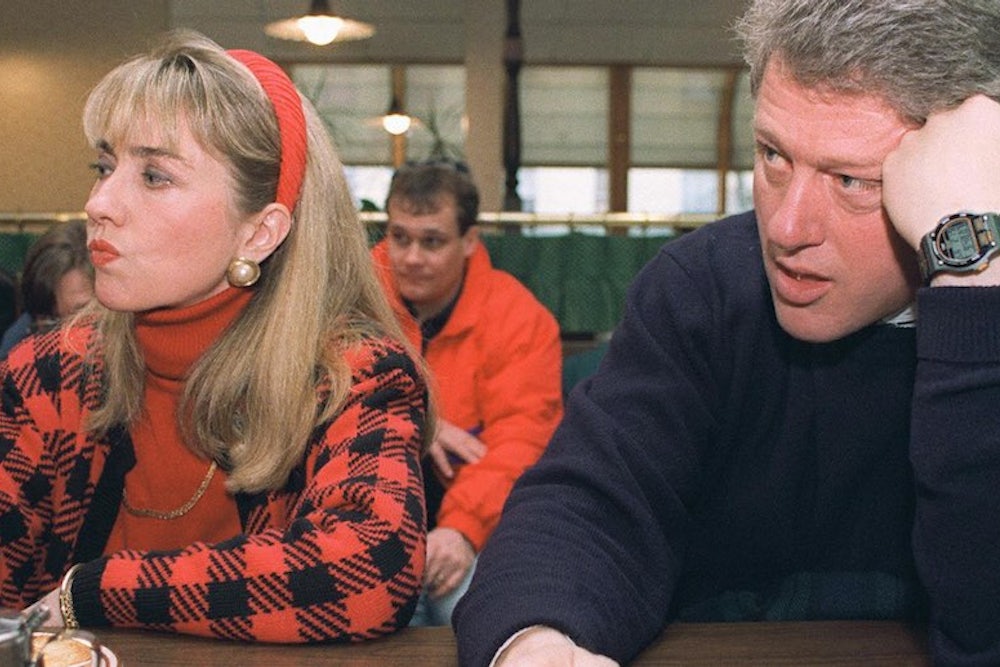After announcing Sunday that she's running for president, Hillary Clinton received hundreds of thousands of supportive messages on social media, perhaps the oddest of which was a well-wishing missive posted on Facebook by Cliff Jackson, an Arkansas attorney. Back in the 1990s, Jackson was one of the chief instigators of a wave of conspiracy theories about the Clintons. He had created an anti-Clinton group grandly titled the Alliance for the Rebirth of an Independent America, which was headquartered in a houseboat on the Arkansas River and was decorated with bumper stickers that read, for instance, “Smile if you’ve slept with Bill Clinton.” Jackson was instrumental in making Whitewater, and Bill's alleged harassment of Paula Jones, into national scandals. And it was Jackson who introduced David Brock of the American Spectator and other journalists to disaffected Arkansas state troopers who offered lurid tales of Governor Clinton using state resources for illicit sexual ends.
Troopergate, as the resulting brouhaha was called, joined a long list of scandals or pseudo-scandals that engulfed the Clintons in the '90s, including Whitewater, Travelgate, Nannygate, as well as various alleged and real sexual improprieties involving Bill Clinton. Jackson, like some other erstwhile Clinton enemies, wants to put his scandal-mongering behind him.

Yet malicious stories have a way of persisting even when disavowed by those who first spread them, and the fact that the storytellers no longer believe in their tales will do little to dissipate the cloud of conspiracy mania that hovers around the Clintons.
More than almost any political actors in American history, the Clintons have been the subject of elaborate and hair-raising conspiracy theories. To be sure, President Barack Obama has faced his share of mudslinging from birthers and their ilk. Yet the personal attacks on Obama, transparently motivated by a racist desire to portray him as exotic and un-American, don’t quite measure up in their sheer embellished loopiness to stories about the Clintons' murdering their aide Vince Foster or running a cocaine cartel out of the airport in Little Rock.
Almost all these conspiracy theories and scandals, aside of course from the former president committing perjury over the Monica Lewinsky affair, have been discredited, but these controversies have had a lasting effect on public opinion. There is a natural inclination among people to think that persistent hubbub in the press over scandals are based on some reality. Polls show that a sizeable percentage of Americans distrust Hillary Clinton, with levels of suspicion only increasing in the wake of the recent controversy over her use of a personal email account and homebrew server while serving as secretary of state: A Quinnipiac poll last week found that in three key swing states—Colorado, Virginia, and Iowa—between 49 and 56 percent of respondents think she's not honest or trustworthy.
And yet, in recent years, Jackson has had a conversion experience on the Clintons, something true of a surprising number of once vicious Clinton foes. David Brock, whose stories in the American Spectator drove the narrative on not just Troopergate but also the alleged harassment of Paula Jones (which paved the way for revelations about the Lewinsky scandal and Clinton’s impeachment), has famously apologized for his tabloid journalism and is now an ardent Hillary Clinton supporter. The late press baron Richard Mellon Scaife, who once spent nearly $2 million financing the anti-Clinton muckraking of Brock and other right-wing journalists through his “Arkansas Project,” reconciled with the former president, and ended up donating $100,000 to the Clinton foundation and having his newspaper, the Pittsburgh Tribune-Review, support Hillary Clinton’s 2008 run for president. Scaife’s onetime right-hand man Christopher Ruddy, the CEO of Newsmax Media and author of The Strange Death of Vincent Foster (1997), sheepishly admitted in 2009 that he had been “overzealous” in the '90s and even called Bill Clinton “a great president.”
In their fine book The Hunting of the President (2000), Joe Conason and Gene Lyons made the case that most of the supposed Clinton scandals were ginned up by partisan enemies, originally motivated by obscure Arkansas vendettas, and were subsequently adopted by the national right. This argument has been validated by the remorse or second thoughts expressed by Jackson, Brock, Scaife, and Ruddy.
But there's one complicating factor: Bill and Hillary Clinton are their own worst enemies when it comes to conspiracy theories about them. These scandals keep erupting because the Clintons behave in ways that raise suspicion. Bill is excessively gregarious, and sometimes glib with the truth (“I did not have sexual relations with that woman.”). Hillary, meanwhile, is sometimes too protective of the truth, seeming defensive when pressed for specific facts (as during her news conference about the email scandal). And the Clintons have a habit of surrounding themselves with dubious characters like James McDougal (the source of their Whitewater woes) and Dick Morris (who, after breaking with the Clintons, has fed the right's appetite for unhinged Clinton criticism).
Cliff Jackson and others have moved beyond their conspiracy theories, but many others haven’t. And nothing Jackson says, or writes on Facebook, can kill the ghosts of Troopergate that linger in the right-wing imagination. In fact, now that Hillary is presidential candidate, many such ghosts are likely to re-emerge in the conservative and even mainstream press. How she handles them may determine whether the Clintons move back into the White House.
